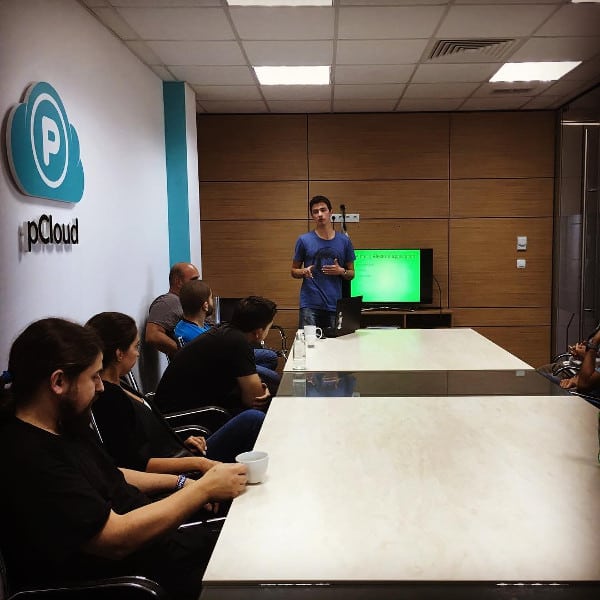Cloudwards Talks With the Boss: pCloud’s Tunio Zafer
Most of the time, none of us have any idea who is behind the software that drives our lives. Cloud storage, VPNs, web hosting: the people creating it are a blank. To fix that, at least a little, Cloudwards.net sits down with industry leaders to ask them about their companies. In this edition, we’re talking with the CEO of pCloud, Tunio Zafer.
There’s no use denying that at Cloudwards.net, we’re pCloud fans. The service ranks second among the best cloud storage providers and our pCloud review is a series of glowing recommendations. As you can imagine, we were pretty happy to sit down with Tunio Zafer, pCloud’s CEO, and talk a bit more about his company.
As is customary in 2020, the first thing we discussed in our Zoom call was COVID-19 and how it has influenced pCloud. According to Zafer, the company is trying to make the best of it. As the world has retreated into their homes, use of online services has shot up and pCloud has seen an uptick in new users of over 30 percent compared to the same period last year, to a new total of more than 12 million subscribers.

Understandably, the company is happy with the results. “It’s an interesting time to live at the moment,” he said. “We’re trying to achieve as many new users and customers, at the same time trying to help people to work remotely from home.”
As for the kind of people these new customers are, Zafer has noticed that they seem to be new not just to pCloud, but to cloud storage in general. “We see new customers that are really new to cloud storage […] they are coming to the service to see what it is and how it’s working.”
10,000+ Trust Our Free Cloud Storage Tips. Join Today!

- Demystify cloud storage terminology and key concepts in plain language
- Discover easy-to-implement techniques to securely backup and sync your data across devices
- Learn money-saving strategies to optimize your cloud storage costs and usage
According to Zafer, most people have thought of cloud storage as a way to “store information and make sure it’s accessible all the time and secure and private.” However, starting in March of this year, more and more people are sharing files with friends, family and coworkers. It’s been a bit of a revolution, and Zafer was clearly pleased with pCloud’s growth.
How pCloud Got Started
It’s been a long road, too. pCloud’s humble beginnings were in Sofia in 2013, with Zafer and now-CTO Anton Titov as founders, after they saw there were concerns about the accessibility and security of existing cloud storage providers. They and their team thought up a few ways in which to overcome these weaknesses and pCloud was born.

The main concern from the start was users’ privacy. When asked why the team focused on this so strongly, Zafer replied immediately and with certainty.
“The new gold of our era is information and if you don’t keep your gold (safe), somebody will come and steal it.”
— Tunio Zafer
At the same time, offering a service that does not sell any information about its customers or use it to target ads is a draw for consumers. During our conversation, Zafer brought this up as a major draw of pCloud.
A “Genius” Team
Of course, this isn’t the only reason pCloud has grown as it has. Many members of the team had a track record in similar fields, Zafer says, which lifted pCloud to its position in the top five cloud storage services worldwide by size in just seven years. However, he is humble enough to realize it’s due to his team as much as himself and admitted as much.
“I’m proud of my team,” he said, beaming. “In my team, there are some genius people and we can achieve almost everything we’re working on,” adding that some competitors have “hundreds, even thousands” of people on their teams, while pCloud does much the same with a team of just 42.

Of course, most of those people are currently working from home, which gives rise to the question of how the current crisis has changed the way the pCloud team looks at remote work and how it has changed their view of what the program should look like.
“We’re trying to get into the new reality,” said Zafer. “I see now how my colleagues are working with pCloud.”
— Tunio Zafer
The new reality is inspiring them how to improve existing features and also add new ones. One of the biggest on Zafer’s wish list is real-time collaboration, which plenty of competitors offer but pCloud doesn’t.
You can work together on a document, but you can’t see the changes in real time like with, say, Google Drive. Any changes made need to be uploaded first — and while it’s very popular, the pCloud team still wants to work more on its functionality.
Another milestone for the company was the Rewind function, which lets you rewind (it’s in the name, really) the state of files from 365 days in the past and restore them, a great way to recover data. Add to this a network of geographically dispersed cache and proxy servers, and you have some serious speed gains, as well.
Improving Security & Privacy
At the same time, nobody wants to give up pCloud’s excellent security. When the company was started, security was the most important principle, after all, but this is where there’s a problem. “When you use non-encrypted cloud storage, the service can help you with some of the tasks,” said Zafer, like building up thumbnails or even working directly in a document. However, that changes when you use zero-knowledge encryption like pCloud does.
In short, zero-knowledge encryption is a type of security where the service you’re using has no access to your password or security keys. It’s very secure, but it also means that your provider can’t retrieve your password for you, nor can it transcode videos or give you file previews. In the words of Zafer:
“We don’t even know the names of the files you store with us.”
— Tunio Zafer
As such, adding more sharing and collaboration features would mean weakening security. The solution pCloud decided on is, according to Zafer, a hybrid service, where you can decide where to keep your files: if you need top-notch security, leave it in the Crypto folder, which users need to pay extra for. If you need the previews or to share a file, leave it in your regular folder.
This mix strikes a chord with users, according to Zafer, who added that “maybe we are the only company that sells this kind of service at the moment.”
The Crypto Kerfuffle
However, over the years we here at Cloudwards have received some complaints regarding the way pCloud handles private encryption. In a few comments below the pCloud review, as well as some emails back and forth with users, some users reported they have had their files removed — occasionally even had their accounts suspended — for storing files that go against the pCloud terms of service.
One recurring accusation in these messages is that the people in question feel like they’re being blackmailed into using Crypto, which costs extra. Zafer strongly denied any such charges.
“We have an automated system that has the ability to check files without knowing anything about them […] if someone uploads or shares something which is inappropriate and violates our terms of service, the system will automatically do this (take action).”
At no point, Zafer said, is there any real, live person involved in this process. The whole aim is to make sure that pCloud isn’t in violation of any laws regarding copyright or the like. The emails serve to warn people that they have something that goes against the ToS so they can remove it and continue to use pCloud.
If you want to store questionable content on pCloud and not receive these emails, you can sign up to Crypto, but it’s not like the system is set up to extort people into using it.
However, this question does lead to another: how do consumers know that a service really is zero knowledge? In the case of pCloud, they simply made the code public. Anybody can check if and how it works for themselves, though you probably need to know a little about coding if you want to take a look.
On top of that, a year or so ago the company started the pCloud Crypto Challenge, which invited hackers worldwide to beat pCloud’s encryption. With a prize of $100,000, it’s no wonder some 3,000 people took part, though none succeeded, Zafer said with a hint of a smile.
In It to Win It
As for the future of pCloud, Zafer made no bones that his company is in it for the long haul, and cites pCloud’s lifetime plans as proof of that commitment. These plans serve as a sign that:
“We’re on the market to stay here, not for months, not for years, but for a lifetime.”
— Tunio Zafer
However, it has given rise to some speculation within the Cloudwards editorial team that perhaps services offering lifetime plans are setting themselves up for trouble. After all, a lifetime is a long time and storage isn’t free.
Zafer, however, was quick to set the record straight, and in fact trotted out some math to defend his position. According to him, storage is only getting cheaper, thanks to great improvements in efficiency and redundancy, some of which have been powered by pCloud’s very own research and development team.
Every file uploaded to pCloud is copied four times and then stored across 15 servers. At the same time, it’s shrunk to a factor of 1.4 to 1.6. As an example, if you were to upload a single file of 1MB, it’s copied four times, meaning there are five copies across several servers. However, the size wouldn’t be 5MB, but between 1.4MB and 1.6MB.
This is a major space saver, and pCloud looks only to further improve it. Of course, with a team of geniuses behind him, an increasing interest in keeping files private and a trend toward working at home, Zafer has plenty of faith in pCloud, and we do as well.
Thank you for reading this edition of Cloudwards Talks With the Boss. We hope to make this a regular feature. We are taking requests for the next figure in cloud computing we should speak to, so leave a reply in the comments below. Also, for more on cloud storage, check out our archive.
